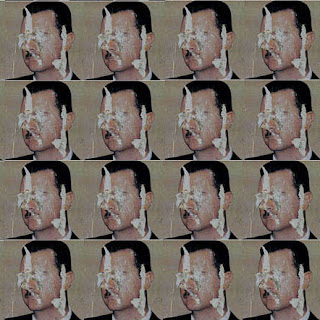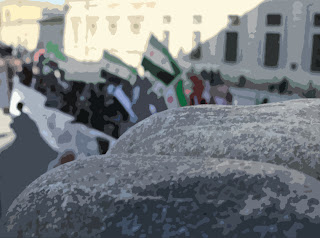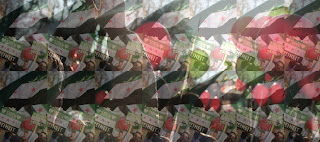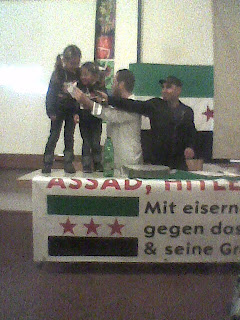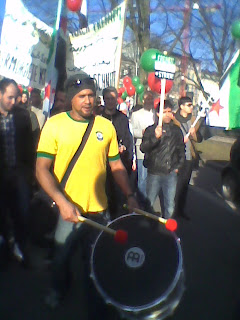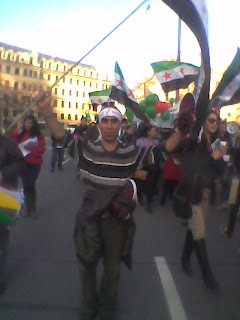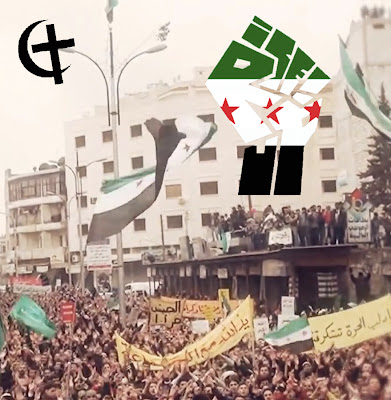About two weeks until Mar15, time for a summary due to the anniversary of the Syrian revolution. The incredible amount of mainly dramatic events from Idleb in The North to Deraa in the South, from Lattakia in the West to Deir Ezzor in the East up to now would fill without problems a whole book for sure.
How has it all begun? A handful of teeners, inspired from the Arab Spring awakening in the neighbor countries, sprayed some graffitis on the houses and walls in Deraa and got arrested for that. Well, in the so-called civilized Western hemisphere the boys might have faced a similar fate in the case of getting caught from the police but we‘re talking here about Syria, the land where the mafia-like organized clans around the Assad dynasty on the top installed the last nearly five decades a complex system of surveillance and random arrest up to lethal torture measures during interrogations or in the worst case just for fun.
It were the family members of the arrested kids going protesting on the streets and becoming arrested as next. At that time the regime might have mildly smiled about the attempts of a few to demand publicly freedom and dignity but the spark flew very quick over the whole country, more villages and cities witnessed protest marches, not as huge as we saw them for example in Hama early summer where hundreds of thousands participated but somehow enough to disturb the ruling elites strengthening as a result the crackdown order. especially after the 13 year old Hamza al-Katheeb became the first martyr symbolizing the inhumanity of the regime.
As a reminder: in Tunisia it was Mohammed Bouazizi who‘d set not only himself on fire in Dec 2010 as an ultimate sign of protest against his forced unemployment inciting but also the eruptive revolt against the former president Ben Ali. In Egypt the blogger Khaled Said who died under more than suspicious circumstances after getting arrested in June 2010 became a symbol of the uprising against the crusted Mubarak regime apparatus. And with Mo Nabbous‘ early death caused by Gaddafi‘s security forces unified the Libyans in their finally successful resistance against the most eccentric of all the despots. For us not being grown up in the Islamic culture circle it is hard to understand what eminent symbolic character those martyrs are having for the revolutionary movements in the Middle East/North African region.
I think it‘s time to explain here and now how I became connected with the Syrian revolution. Beginning writing and posting on Twitter and Blogspot I first got in contact with the Yemeni revolution against their stubborn and impertinent ruler Abdullah Ali Saleh. Mostly I was touched by the images of Sanaa and Taiz showing young people and women orchestrating really peaceful protests against the unwanted regime. But the answer of this regime was - to be expected - excessive violence. At that time only a few videos with graphic content circulated in the web as it is today most of all in the case of Syria but the descriptions of the Yemeni tweeps inside stuck between hour-long live gunfire and heavy artillery bombings shifted the global awareness a bit direction KSA‘s Southern neighbor. I tried to do my best retweeting, posting and sharing the occurences in one of the world‘s poorest countries with my growing Twitter community and my mail contacts here at home. The last mentioned reacted by the way not in my expected impact rate - not a reproach, everyone has for him- or herself to decide it and how much awareness he or she is ready to invest in the good cause for freedom and justice in other parts of the world but somehow I was a bit disappointed I must admit. On the other side my microblogging site‘s follower circle filled more and more with really exciting new people. After the Yemenis I got in contact with the Libyan online freedom fighters tweeting very self-confident for the liberation and keeping me from the first moment attracted. The Arab Spring spark incited me positively becoming the so-called Benghazi fever - the hotspot and starting point of the glorious resistance against ,brother leader‘. Among the thuwwar there were also many Syrians, most of them expats but a few were tweeting from inside Syria. My first Syrian online contact was a young guy from Damascus who‘ll stay anonymous here oit of security reasons for him and for his family bearing the risk of getting arrested by the regime forces or the intelligence. Like we all he tweeted passionately in powerful terms against the tyrants of the Arab world including his own president what I paid with a lot of respect. We‘re both deeply connected through our faith, he as a Sunni, I with my Lutheranian background. A central pillar of our religious attitude is the tolerance for each others‘ faith, respecting the values of both holy books, the New Testament as well as the Holy Quran. I‘m mentioning those details with the main reason to explain my personal motives being connected with the people of the Arab Islamic world. One day my Syrian brother in spirit shared with me a Youtube link: a smaller group of protesters met at the end of a street in the Damascus suburbs a unit of armed security forces. They‘d targeted the young men with their guns in two rows, one kneeing, one standing behind. The guys were emotionally discussing and the mobile camera operator moved preventively behind a huge trash bin as one of the protesters went with raised arms and opened hands as a gesture of being unarmed towards the soldiers. In that moment the uniformed opened the fire. the recording became shaky when the young protesters began suddenly to run for their lives, two or three of them were carrying a brother getting hit by a bullet. Shocked and speechless I witnessed the dramatic footage. Never before I had seen such images. The same day my mate shared with me another Youtube link, this time containing images of a young man lying on the tiled ground of a side entrance, eyes wide opened, above his left ear a huge bullet hole in the head, bleeding heavily. With an injury like that he had no chances to survive. Next to him sat another protester who had luck not being shot or otherwise hurt telling direction of the camera on Arabic of the gunfire the soldiers had opened at them. Then he put two fingers of his right hand into his friend‘s blood and wrote place and actual date with it on the floor to show everyone who sees this video that this really had happened even if the regime would deny it. Both videos became my personal tipping point joining from that time on avec coeur the Syrian revolution. One single moment can change your whole life. In my case it were two single moments being eternally branded in my own memory.
The freedom movement was continuing to protest against the regime and to demand from the world more support during the late spring and the beginning summer. As bitter as it might sound now but we were getting used to the daily one or two dozen martyrs reported still hoping for more effective measures of the international community to stop the bloodshed the regime forces were causing. But the Western alliance was itself busy at that time assisting the freedom fighters in Libya as decided on the UN resolution No.1973 and having with that a general excuse for not engaging at the same time in another region. Meanwhile I was getting in contact with Syrian expats here in Bavaria who started rallies in solidarity with their protesting fellows inside their native country. Straight at the first rally one of the participants showed me two sinister looking men standing a bit offside from the event and taking pictures of the people: pro-regimers. Supposedly ordered directly by the Syrian embassy in Berlin. Mentioning as edgy detail that one of them reportedly might be a diplomatic employee of the group expelled from Germany a few weeks ago. So they had from the beginning on even a photo of me .. considering that I performed later on different other rallies publicly holding speeches and chanting against the regime .. anyway. Ibrahim Qashoosh‘s ,Yalla Ir7al ya Bashar‘ (Leave, Bashar!) became the alternative Syrian national anthem, while his creator had to pay a high price for that. The regime killers didn‘t only cut his throat, they‘d also removed his larynx as a sign to all the others that they risk getting similar treated if they also insult the president. But the planned deterrence turned into the opposite. Qashoosh became known far over the Syrian borders and appreciated by other artists worldwide in different expressions. I‘d never really expected to become myself one of them performing his song in origin language shouting the refrain through a megaphone during one of the rallies last summer. Suddenly I was the German Qashoosh, the only German for sure at that time chanting his rhymes even if it was all but easy in the beginning due to the Arabic pronounciation. But the most important fact was the song keeping spread and with it the remembrance for a truly courageous Syrian living now through our voices. Ibrahim Qashoosh, we will never forget you.
Because of being simply impossible if not lethat to build publicly a serious opposition movement inside Syria - the existing so-called opposition groups are hired henchmen of the presidential mafia - under the lead of expats the Syrian National Congress SNC was formed mainly being busy with getting recognized by the global nations like their Libyan inspiration, the NTC, representing an alternative as transitional government after Assad‘s downfall. That was exactly the crucial argument of all the sceptics and fearmongers outside: what would happen politically after the toppling of the regime? Aren‘t there huge risks of an increasing chaos without a solid leadership? Burhan Ghalioun and the other SNC members argued wisely against that presenting a well thought and convincing political program. But the general mistrust of the civil population against officials as such is still big and it will become in common a challenging task for the self-claimed umbrella organization of the free Syrians to raise sympathy. They know, if they might fail they‘ll land in the same garbage bin like all failed professional politicians.
Nobody of us could predict or foresee that the violent crackdown measures of the regime became such excessive with the beginning of the Ramadan last year. Until then mainly on Fridays huge demonstrations took place after the traditional prayers. But during the month of fasting the protests started daily. The numbers of the martyrs became doubled, tripled, quadrupled. Still all our hopes were lying in the Western nations, the Arab neighbors, the United Nations, simply everyone being able to stop immediately the terror against unarmed civilians. Instead we only witnessed the classical escalation ladder of international diplomacy: clear words from the world leaders (,We are condemning in the strongest terms‘, ,Assad has lost his legitimacy as president‘, ,we will send a strong signal‘) imposing political and economical sanctions like travel bans for Syrian officials, freezing regime assets and the import of Syrian trade goods but not being able to realize successful actions ending the regime violence immediately. So the death accompanied further on the peaceful uprising.
In such moments the origin optimism and euphoria of the revolutionary moment become mixed with disappointment, exhaustion, frustration - and justified anger. The slogans of the first days demanding the end of the existing political era became stronger: The iconic ,ash7ab yureed isqat al-nizam‘ (the people demand the removal of the regime) became ,ash7ab yureed 3adam al-rais‘ (the people demand the execution of the president). Every pacifist nature getting scared by such strong words should consider that these regime forces don‘t carry their velvet gloves during the crackdown. What they‘re commiting is in simple words said planned mass murder, nothing else. It‘s very hard to imagine that a mother or a father whose child was shot like a stray dog by a sniper on the way from school or to the bakery tend to react in a forgiving mood. Saints, yes, or the few given an extraordinary huge part of forgiveness by nature, maybe, but we, the average people with our average emotions and expectations on life itself for sure not.
Besides Hama, the city where in 1982 one of the most horrible massacres took place and which became now famous for their breathtaking protests, also Homs, together with Aleppo the economical motor of the nation and very famous for the humor of its‘ inhabitants, turned more and more out as a revolutionary hotbed. Remembering the legendary videos where the Homsees presented eggplants as hand grenades or walking sticks as rifles to show the rest of the world that they‘re not defensing themselves with real arms against the security forces as the regime repeatedly claimed. They disproved the ,armed gangs‘-myth showing homemade catapults used to shoot potatoes and onions (raw, not cooked) above the roofs in the direction of the regime troops and made us smile for those moments despite the cruelties of death, terror and destruction we were constantly facing. The only ones who couldn‘t really laugh about that were the regime representatives themselves. A massive offense of the army and the thugs, driven by revenge, was the result, whole neighborhoods were nearly completely destroyed and huge massacres took and still take place in the city not far away from the Lebanese border. Inshaat, Bab Sbaa, Al Khaldiye and Baba Amr are the mainly concerned districts looking more and more like Beirut in the 80‘s or today‘s Mogadishu. The people there are kind of caught inside, soldiers are keeping barriers and control posts between the different neighborhoods, hospitals became death traps for wounded protesters, the whole humanitarian situation is in the meantime far over the critical point.
With the first defections from Assad's military the Free Syrian Army FSA began to form under the command of Colonel Riad al-Asaad. More and more soldiers refused to open the fire on their unarmed fellowmen, a courageous decision because they're risking from that moment on getting immediately killed by their former comrades or the security forces. Mainly in Idleb and Homs the FSA tried to protect the civilians from attacks of the regime loyals and prevented more massacres. Of course Assad's favorite argument of 'armed gangs' might have become with the foundation of the FSA objectively regarded a certain justification but we have to consider that the defectors are people simply saying no to slavish obedience in the name of the origin military oath, to protect besides the nation most of all the own population instead of slaughtering them. The international community is until today not in a position to grant the civilians the needed shelter and the FSA soldiers are doing their best to grant that. Without their admirable engagement the security forces, the regime army and the shabee7a (ghosts) would have murdered up to now many more Syrians. The calls for arming and supporting logistically the FSA are becoming louder and I'm also pleading for that in the name of self-defence. Being still a defendor of non-violent tactics (yes, I've studied Gene Sharp's books as well as the ideas of the CANVAS center) I'm realist enough to perceive the natural line justifying armed counter measures: if the opponents' side not only refuses to lay down the guns but permanently is shooting and killing. Sorry, dear pacifist fundamentalists.
The autumn started with the next chapter of the political tragedy. The Arab League, often blamed as 'club of dictators', felt - also due to a pointer from Moscow - obliged to start an own mediating mission antagonizing the reproaches being too much inactive. But in comparison to the speed the League made decisions even an old ponderous steam train appeared as a tuned Transrapid. We all had the desastrous experiences of the Gulf Cooperation Council GCC in Yemen in our minds when Saleh blamed them however he wanted. So it wasn't a real surprise to witness more the deferrals of the decision-finding meetings than the results themselves while Assad and his henchmen were unimpressedly busy hunting the civilians all over the country. After a felt eternity - more precisely said: more than thousand murdered civilians later - the monitors' mission became reality under the command of the Sudanese general al-Dabi, a very dubious figure regarding topics like human rights and objectivity in reporting. The images we'd seen after the mission's start were indeed the expected utter mockery. Lousy prepared, more lousy equipped the orange vests were strolling through the streets, being self monitored by their guest hosts of the regime. All in all they reminded more on a company outing than on a fact finding mission. The uploaded Youtube videos (the official Adounia images were definitely senseless to watch if you're not addicted to unintended humor) showed emotionally gesticulating citizens trying to present the monitors places where explicit regime crimes had happened. Most of all al-Dabi appeared the whole time very absent and disinterested. While he used when asked about his impressions and estimations a regime-conform language the first mission members left the country reporting from the safe side about very disturbing ongoings in Syria relating to the regime policy. Not to forget the ominous explosions in Damascus straight at the beginning of the monitors' mission: smelling very strong after regime orchestration. This might sound pervert now but the whole uprising had became at this point thanks to the Assad bunch a kind of grotesque boulevard theatre.
And those suffering? The activists of the Local Coordination Comittes Syria LCCSy, the protesters, the civil population? In our modern informational society it would be to expect that regime wanted hollywoodisation might have put the fredom movement into a corner. But the brave protesting and freedom striving people have successfully avoided to step in that trap continuously fighting for their origin demands. And the international community itself - surprise, surprise - had voted during the last United Nations Security Council meeting on the topic Syria with 137:12 for an extended resolution the Arab League brought on the table. Among the dozen veto nations are two big players, Russia and China, indeed, able to block the majority with their stubbornness but otherwise it is finally a small victory of the good and fair cause. After all that time even this more symbolic result causes something like satisfaction. The most important is still to keep the focus on the people themselves inside Syria whose life and existence took always place under the Damocles sword since Hafez al-Assad took over the power almost half a centenary ago but today after beginning to overcome the wall of fear even a bit more.
Many have sacrificed their lives on the way to freedom and dignity since the uprising began. Their martyrdom is not a part of a statistic. Behind each one of them stands a personal story, a family and friends mourning over the loss of a beloved one. Almost every Syrian can tell about a relative or a good friend being murdered or getting detained by the regime. Thousands of political prisoners, many of them arrested since decades, are still waiting for their release or their liberation. There is a certain expression in Syria for those being detained: they are behind the sun. Todays‘ activists have also made their experiences during the arrest. Some had luck like the Blogger Razan Ghazzawi being in the meantime twice detained and released - the last one purposedly due to the circumstance that the online community raised during her detention enough global awareness. Others had less luck like Giath Mattar who became a tragic victim of the horrible torture machine: after the regime sadists had token out his organs his mutilated body was handed to his family. Like so many others he will never be forgotten.
There are so many stories worth telling here around the Syrian revolution but I‘ve decided only to mention those events having kept in my memory without detailed recherche or links to articles. As I said in the beginning the whole amount of occurences would fill for sure a whole book. But the revolution isn‘t finished yet. Assad is still residing in the presidential palace playing with a lot of chuzpe Mister Mou7amara (conspiracy). His mercenaries are still murdering civilians in the Syrian cities and villages. Putin‘s regime is still keeping their dirty buddies in power because of defiance and own interests warning loud and clear that the Western led coalition has to avoid intervention - even if it sounds like a bad double-standard joke because Assad‘s partner in crime Achmadinedschad can send his al-Quds brigades as a supportive measure without risking serious consequences. But the decision to continue the fight for freedom after a year full of martyrs and suffering is planted deeply in the hearts, the heads and the minds of many irrevocably. I believe they knew from the beginning that it wouldn‘t become easy. That the price for regaining freedom, dignity and justice might be high, very high in the extreme case. This revolution has also changed me. The first word I‘d learned in Arabic was 7orrieh (freedom). A creative nature with a heart for the weak ones became Mundass Almani, the German-rooted regime enemy. And I‘m carrying that title today full of pride. From all revolutionary slogans I‘ve learned during the last twelve months one has touched my heart in a special way:
,Al-mawt wa la al-mazale.‘ Better death than oppression.
For a long time I was searching in my memory where I had heard or read it before. Now I remember it. More than a year ago, short before the Arab Spring erupted. Over the entrance door of a mansion on the island of Sylt in the far north of Germany. There is stood in Frisian language:
,Lewwer duad üs slaav.‘ Better dead than being a slave.
The slogan of Northern Frisia. The slogan of the freedom striving Syrians. The slogan of all freedom seeking human beings in the world. And also my slogan.

